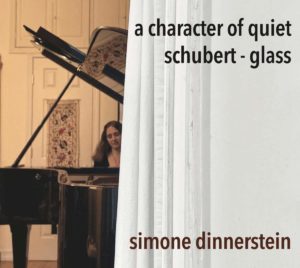No New York City resident has been immune to the physical and emotional stress resulting from the pandemic and various states of lockdown, and that unquestionably includes working musicians. Luckily, pianist Simone Dinnerstein had the luxury of recording at her Brooklyn home in June, 2020, with her concert grand perfectly tuned and engineer Adam Abeshouse on hand to obtain clear and vivid sound in a non-studio setting.
Dinnerstein subjects the Schubert B-flat sonata’s long first movement to a constant and rather predictable stream of ritards, tenutos, and accentuations that are more mannered than they are expressive or structurally pertinent. Granted, hers is not the most indulgent or soporific performance around, yet it’s a far cry from the combination of simplicity and discipline distinguishing Leon Fleisher’s Vanguard recording, not to mention the large-scale focus heard from Leif Ove Andsnes and Stephen Kovacevich.
On the other hand, Dinnerstein sustains her broad tempo for the slow movement beautifully, keeping a lilting yet firm grip on the left-hand ostinato that acts as both an anchor and a foil for her ample right-hand cantabiles. Dinnerstein’s Scherzo is rhythmically all over the place, as if she’s not exactly sure how she wants the movement to go. The pianist’s picky phrasing throughout the finale lacks continuity and contrast, notwithstanding her power in the minor-key episodes’ dotted chords, along with a comparably assertive coda.
A selection of Philp Glass Etudes better withstands Dinnerstein’s propensity for inflection. She brings welcome variety to No. 16’s repetitive patterns and consequently intensifies the moments of harmonic tension, in contrast to Bruce Levingston’s much brisker yet musically undifferentiated rendition, to cite one comparative example. Unlike Maki Namekawa’s efficient and cool-headed way with Etude No. 6, Dinnerstein is all turbulence and volatility, almost Schumann-esque. She stretches out Etude No. 2 to an epic 11 minutes, savoring every note without losing any sense of narrative–a totally different sound world compared to the multi-layered surface sheen characterizing Vikingur Olafsson’s recording, which clocks in at six minutes. The sum of my overall rating splits the difference between Dinnerstein’s absorbing Glass and indulgent Schubert.
































